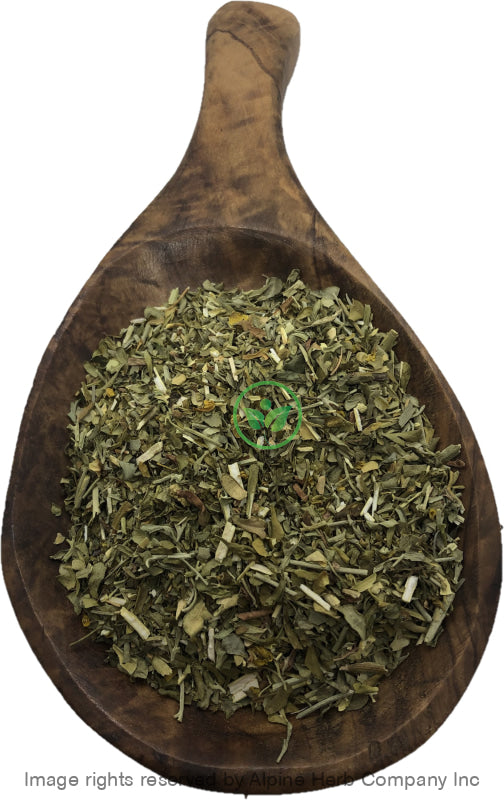Rue Herb Cut Alpine Herb Company Inc.
$ 12,99 $ 7,79
Botanical Name: Ruta graveolens
Common Name:
- English: Garden Rue
- Unani: Sudaab, Suddaab
- Siddha: Aruvada
- Also, known as: Wynruit, Taena Adam, Chou Cao, Wijnruit, Rue, Weinraute, Ruta, Ru, Duan Aroda, Arruda, Ruda, Erruda, Arroda, Rue, Herb of grace, Country man’s treacle, Herbygrass, Rue fetide, Herbe de grace, Fayjan, Sadab, Peggan, Sadab, Basshash, Sedefche, Chau chou, Ging gaai chat, Siu heung chou, Wahn heung, Chou cao, Chow-cho, Jing jie qi, Xiao xiang cao, Yun xiang, Chou ai, Ruuta, Tuoksuruuta, Rue odorante, Herbe de grace, Peganium, Raute, Weinraute, Gartenraute, Weinkraut, Satapa, Satari, Sitab, Henruda, Sadabu, Daun aroda, Maruya, Ruta zwyczajna, Arruda, Sadapaha, Suvarchala, Aruda, Aruvada, Ruta zapashna, Sadova ruta, Sadab, Sudah
Origin: Bulgaria
Harvested: Wild or cultivated
Parts Used: Herb
General Information:
Ruta graveolens, is a strongly aromatic perennial shrub about 2-3 feet tall, with individual round stalks that shoot up right from the base. Some of them split in two, but most are single stems, with a cluster of leaves at the distal end of the stem about three quarters from the base. Some stems are tall and slender. Pinnately divided, blue-green leaves are 2-4-inch-long having oblong to spatulate segments. The foliage has a pungent aroma when bruised and leaves have a bitter taste. The rounded small leaves are disposed symmetrically on the upper part of the stem. They are very light and bright green when young, turning into a green-grayish tone as they get older, eventually becoming brown at the tips and falling off. Some older leaves are covered with a white soft layer underneath the blade. The bright yellow fringed flowers with protruding stamens are star-like and grow in clusters, facing straight up. The central flower has five petals, while all other has four. The rounded petals are initially curled around the center and slowly open up, forming a protective shield for the light green, ovary, which gradually swells up, until the petals are no longer necessary and drop. The fruit is a brown seed capsule.
One of the most striking features of this plant is indeed the strong, aromatic, bitter or acrid scent, but once you get used to it, it can be very soothing and comforting. It is the source of Rue or Rue oil, called as Sadab or Satab in Hindi. The oil and fresh or dried leaves have been widely used in perfumes and foods of all sorts. It is used in Ayurveda, Homoeopathy and Unani.
How to use:
Hot Infusion:
The basic method for dried herbs and flower is, take 2-3 tablespoons of dried herb in a cup or teapot. Pour hot water over it and cover it with lid for 10-30 minutes. Hot water is needed to draw out the antioxidants, enzymes, vitamins, flavonoids, and volatile oils from the botanicals. Strain and squeeze out as much as liquid as possible and enjoy!
Tips:
- You can sweeten your herbal tea with a bit of honey, natural fruit juice, stevia leaves powder and or licorice root powder.
- You can make ice cubes or pops by freezing tea in ice trays or pop molds.
Precautions:
You should consult with a qualified healthcare practitioner before using any herbal products, particularly if you are pregnant, nursing, or on any medications.
All information on this website is for educational purposes ONLY.
This information has not been evaluated by Health Canada.
This information is not intended to diagnose, treat, cure, or prevent any disease.
| Unit Size | 100g, 200g, 400g, 1kg |
|---|
Prompt shipping and expert packing
Thanks to our longstanding association with UPS FedEx DHL as well as other leading global carriers, we can offer a variety shipping options. Our warehouse staff is highly trained and will be able to pack your goods in accordance with our precise and exact specifications. Your items will go through an exhaustive examination before they will be securely packaged before being delivered. We ship to hundreds of thousands of customers daily in different countries. This is a sign of our determination to become the largest online retailer worldwide. Warehouses and distribution centers are located throughout Europe as well as in the USA.
Note that orders containing multiple items are processed according to the particular item.
We will thoroughly inspect all items ordered before shipping. Most orders are shipped within 48 hours. The delivery time will be between 3 and 7 working days.
Returns
The stock market is always changing. It's not entirely managed by us since we're involved with several entities, including the factory and the storage. Therefore, the actual inventory could fluctuate at any moment. Please be aware that it is possible that your order could be out of stock after you've placed your order.
Our policy lasts for 30 days. If it's been more than 30 days since the date you purchased your item We're sorry to say that we can't offer you a full exchange or refund.
You can only return a product if it is unused and still in the same state as when you received it. The item should be in the original packaging.


































